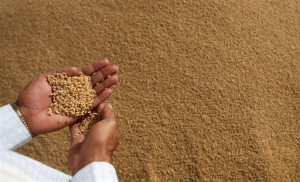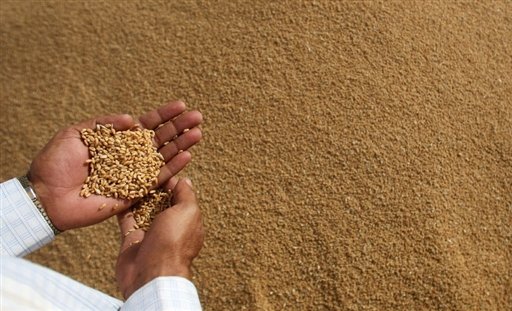
(AFP Photo)
Egypt is planning to purchase wheat imports of 5mn to 5.5mn tonnes in October, with the aim of diversifying its global wheat sources, Supplies Minister Mohamed Abu Shadi told state-run news agency MENA.
“The ministry, through the General Authority for Supply Commodities, targets 5-5.5m tonnes of wheat in the fiscal year 2013-2014 and that is to provide Egypt’s needs for subsidised bread,” Abu Shadi told MENA.
Hesham Abu El-Dahab, a former member in the chamber of grains industry, said the tender deal this time “will be different” as the government plans to diversify its wheat sources.
“The government is now seeking to diversify its wheat sources by considering other countries that can send quality wheat shipments at the best prices,” he said.
“The amount of wheat inventories Egypt has remaining is sufficient until the end of this year, but the government is planning ahead and thus taking decisions to import wheat for next year,” he added.
Abu El-Dahab could not confirm the exact or expected amounts to be imported, but stated that the state’s grain buyer, the General Authority for Supply Commodities (GASC), will be announcing the tender partners and shipment details in few days.
On 30 August, the GASC stated on its official website that its Vice President Mamdouh Abdel Fattah is seeking wheat cargoes from the US, Canada, Australia, France, Germany, Russia, Romania and Ukraine.
The latest wheat tender deal was announced 18 July and was finalized 28 August when Abu Shadi, who was appointed following President Mohamed Morsi’s ouster, decided to resume wheat shipments after they were halted this February.
Since July, the government had bought about 300,000 tonnes of wheat from Russia, Ukraine and Romania, which was the first deal made since February.
In February, the ministry of supplies, headed by former Supplies Minister Bassem Auda, decided to rely on the country’s domestic harvest instead of importing wheat, claiming self-sufficiency.
However, analysts stated that the government’s lack of foreign reserves forced Egypt, one of the world’s largest wheat importers, to cut back on purchases of the grain and rely on the domestic harvest.
Since the January 25th Revolution, foreign currency reserves hit an all-time low, reaching $13.5bn this February, compared to $36bn on the eve of the revolution.
According to Naguib Metwally, the chairman of the South Cairo Mills, stated the previous regime suspended wheat imports and announced that Egypt was approaching self-sufficiency, in a self-serving public relations effort that put the country in a dilemma.
“The country consumes around 750,000 tons of wheat per month, and the government will now be issuing more tenders to import wheat to cover the demand of subsidized bread,” Metwally said.
An economic committee member at the Freedom and Justice Party stated that wheat imports had decreased from 10m tonnes to 6.6m tonnes prior to Morsi’s ouster.
However, the decision to resume imports was further encouraged when Finance Minister Ahmed Galal announced that the $12bn in Gulf aid pledged to Egypt following Morsi’s ouster on 3 July, will be earmarked towards the state’s budget deficit and bolstering foreign reserves.
Galal said $9bn will go towards boosting the foreign currency reserves, which will help the country to import wheat again.
The former government of Morsi was sharply criticised in conflicting reports regarding the specific wheat inventories available. Abu Shadi told Reuters that Morsi’s government made “incorrect calculations” regarding wheat inventories.
Egypt is the world’s largest wheat importer, which usually purchases around 10mn tonnes of wheat per year from international markets and uses a mixture of domestic and imported wheat for its subsidised bread programme.




